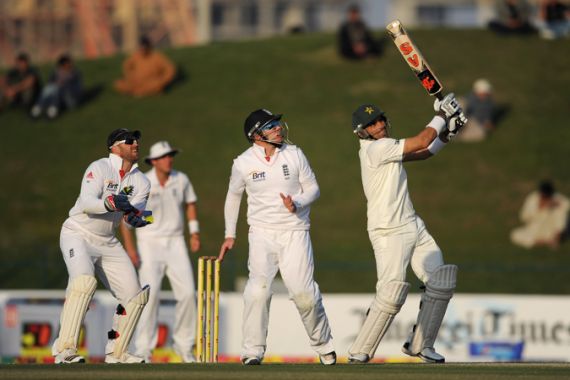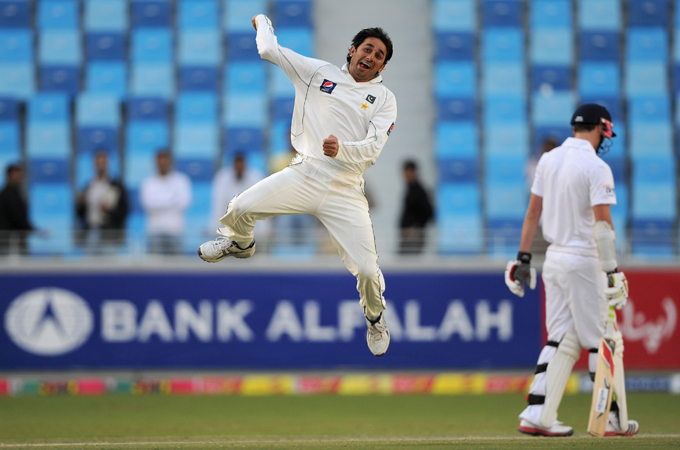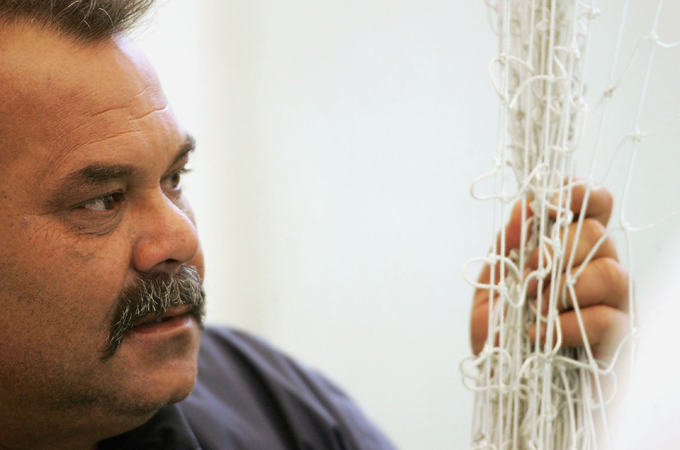Twenty-one questions for Pakistan
Captain, coach, chairman and world-beating spinner of Pakistan’s cricket team talk shop ahead of ICC Champions Trophy.

When Australia take the field at the Melbourne Cricket Ground, or India walk out at the Wankhede in Mumbai, or England jog to the middle at Lord’s, they should all just be grateful for one thing – that they’re at home.
Pakistan have been the nomads of World Cricket since the Sri Lankan team were attacked by gunmen in Lahore in March 2009.
Keep reading
list of 4 itemsHaris Rauf, Hasan Ali back in Pakistan’s T20 squad ahead of World Cup
Mitch Marsh to lead Australia in T20 World Cup but no place for Steve Smith
Pant and Jaiswal in, Gill and Rahul out as India name T20 World Cup squad
But while the cricketing public at home are left waiting, Pakistan have continued to be one of the most talked-about teams in the sport, both on and off the field.
Al Jazeera spoke to the captain who steadied the ship after the 2010 spot-fixing crisis, the spin bowler who has conquered the world despite leaving it until his 30s to make his Test debut, the latest coach to take on one of the more unstable jobs in the game, and the man chosen by Pakistan’s president to take charge of it all.
| Misbah-ul-Haq – Captain and batsman – Age 38 – Test runs: 2,419 |
You’re training in Pakistan before heading off to Scotland and Ireland for your warmup matches for the ICC Champions Trophy. Has being at home held an element of sadness in that you still can’t play international cricket there?
It’s a really, really sorry thing for us that we’re not playing international cricket at home. The people and the players are missing that. The confidence you get when you play in your own conditions, it totally reflects in every team’s performance. But this is how we have to live at the moment.
You’ve brought stability and success to Pakistan after the spot-fixing trials of Salman Butt, Mohammad Amir and Mohammad Asif. What has been your approach?
It’s very simple. Me and the officials, team management and the players – we just promised to ourselves that whatever has happened to Pakistan cricket we’re going to really take off and prove that as a team we can do better, including our discipline, and perform better on the ground. Credit goes to everyone, they’ve shown determination and proved it with their performances on the field and off the field.
How would the team feel about Butt, Amir or Asif returning to the squad if their bans were lifted?
I don’t know at the moment what’s going to happen. It’s all about the cricket board and the ICC (International Cricket Council) – we haven’t thought about that, how we’re going to feel. At the moment everyone’s focussing on what we can achieve for this team, not the players who have bans or who have done something wrong. We just want to do well, we just want to win.
Are you sorry that this is the last Champions Trophy, and what do you think of the Test championship due to start in 2017?
Whatever the ICC is doing is to increase the interest in the teams in the World Cups. In terms of missing it I think that, in terms of viewership and interest of the people, it’s going to be a good move. I feel very optimistic after playing in South Africa.
They are the top team in the world and they were playing in their own conditions. Bowlers like Steyn, Philander and Morne Morkel – it’s a really tough job for any team that goes there. In patches we showed that we can play good cricket. That will help in the Champions Trophy as well. Every player in the team got the feeling they can do it if they put on a good show.
| Saeed Ajmal – Spin bowler – Age 35 – Test wickets: 133 |
 |
| Gotcha: England’s Graeme Swann falls at the hands of Saeed Ajmal during last year’s Test series in Dubai [GALLO/GETTY] |
You’re the number one bowler in one-day internationals, number two in Twenty20s, number four in Tests. How did that happen after starting to play for Pakistan so late in your career?
You know, when I started I thought I’d play maybe two or three years maximum, and then I’d finish. But my trainer and my fielding coach have given me good, strong confidence, saying I could play for Pakistan for a long time if I work hard.
I also got confidence from my captain that I could become the world number one. Starting at age 30, I know it’s late but if you’re working hard you can get anything, man.
There’s been a lot of analysis on how you pause in your run-up just before you deliver the ball. How much does this help you?
My action is the same as when I started aged 16 as now when I’m nearly 36. This came naturally. When I started international cricket people told me, “This is a very good thing, you read the batsman because you stop when you deliver the ball.” But my domestic coaches always said it wasn’t good for international cricket. But I’m showing them that it’s good for me in my international career.
You personally dominated South Africa’s batsmen in the Test defeat at Newlands in February. What was it like getting 10 wickets and bowling someone as good as Hashim Amla?
Hashim is a great batsman – the number one player in the world. The South African batsmen are going to work hard against every bowler so I changed my plans with my bowling coach and captain to bowl against Hashim. It was a turning track – I don’t know why they made a spinning track for me in Cape Town, but I showed them that if they give me a spinning track I’ll perform.
Who is the better spinner – you or Graeme Swann?
You know, Swann is a different type of bowler. He’s a good bowler, he’s number one in the world also. Him, with the variation of the spin or the straight one, while I have the doosra or teesra. He’s doing well for England, I’m doing well for Pakistan – he’s ok and I’m ok too!
Are you disappointed that Pakistani players are still not playing in the Indian Premier League?
Not everyone is playing in the IPL, but we in Pakistan are playing cricket too. They give good money, I know – the players need money. But I play for my country, so no problem. I’m very excited about the ICC Champions Trophy – it’s the last one so we want to win it.
Would you like to captain Pakistan?
I’m happy just as a player. I don’t need attention. I’m a funny guy, just relaxing enjoying cricket. When you’re captain you have lots of problems – especially in Asia! No respect!
| Dav Whatmore – Coach – Age 59 – Test runs (Australia): 293 |
 |
| Whatmore admits to being pretty ‘pissed off’ at losing to Sri Lanka in the T20 World Cup semi-final last year [GALLO/GETTY] |
What challenges are unique to coaching Pakistan?
Trying to be as successful as possible in another country I’ve never worked in before, understanding the culture and how the administration works in this part of the world. Living from day to day. Trying to be successful at that – in order to be successful at cricket.
What were the highlights and low points of your first year?
Winning the Asia Cup. I thought we did well to get to the semi-finals of the World Cup Twenty20. Everything to do with winning games. Winning the T20 series against Australia.
Then there’s the games we should’ve won. We should’ve beaten Australia in the ODIs but we handed it to them. We should’ve beaten Sri Lanka but we snatched defeat from the jaws of victory. That pisses me off.
Being in Pakistan now, what impression do you get of how important it is for people to see Test match cricket in the country again?
I understand the concerns that teams might have. But I have had no problems, no fear for safety on a day-to-day basis here in Lahore. Certain parts of Karachi can be dangerous but I have walked around there without any fear of being hurt.
It comes down to the security that teams are being offered, and I have no doubt that any teams coming here will have good security, and that will allow us to host games in our home country. This country will leave no stone unturned in ensuring the safety of players and officials.
You played Test matches for Australia in 1979 and 1980. What did that experience teach you?
The understanding of pressure. I never had that tough mental attitude – I had more ability than most players but I only ever played seven Tests. I know what it’s like to win and lose and that’s helped me enormously.
What coaching job do you look at and think, “That’s a tough gig”?
Pakistan! All the coaching jobs have challenges. It varies from country to country but the pressures are still there. They’re all pretty hard. Australia? Everything goes in cycles. The team on paper is nothing like the team that used to be there. A test is the strength of domestic cricket, that’s why they’ll never be last. They’ll always be near the middle or the top, and that will be a factor for them to get back to number one.
You won the World Cup in 1996 with your native Sri Lanka. What needs to happen for Pakistan to win in 2015?
That’s just very, very…(pauses). Of course we want to win the World Cup. But I don’t even know if I’m going to be with the team then.
| Zaka Ashraf – Chairman, Pakistan Cricket Board – Age 60 |
Are you confident about international cricket returning to Pakistan?
Yes. The threat that was there when the Sri Lanka team was attacked in Lahore is not there anymore. We have had teams coming to play here and they’ve been very happy. The government and security forces have taken a very strong step against the terrorists and they have run away from this area.
Has the lack of international cricket in Pakistan affected the development and popularity of the game among the nation’s youth?
You would not believe amount of interest and talent there is among the youth in Pakistan. I have driven late at night or early morning and have found young people taking advantage of the empty roads by playing cricket. I have been to villages where they have no electricity, and the whole village will gather round one small battery-powered television set to watch matches.
We just held an event for youngsters to show us what they can do and have selected six boys who will come and train with the national team in Abbottabad before they travel to the UK. There’s one player who is bowling at 148kph.
How damaging has it been financially?
Definitely without international cricket expenses are too high and income is too low. You go to a neutral venue and your costs double. But we’re comfortable doing that and we’re playing cricket, and are hopeful that some day it will return and we’ll get out of this whirlpool. My belief is that it will take one or two years.
The chairman of the PCB has usually been chosen by the president of Pakistan. Does that create instability? Will the election of a new president mean upheaval for the PCB?
We’re now coming into new conditions where the chairman will be elected by the board, for four years, rather than appointed by the president. This has been prepared in consultation with the ICC, who do not support government interference in the PCB’s affairs. Although in my year as chairman, I have not seen the government interfering at all.
If Butt, Amir or Asif have their bans reduced, will they be welcomed back into the team?
The appeals will be decided by the Court of Arbitration for Sport in Switzerland. Whatever will be the decision of the court or the ICC, we will follow that.
Al Jazeera is not responsible for the content of external sites.